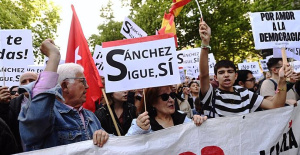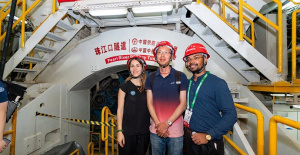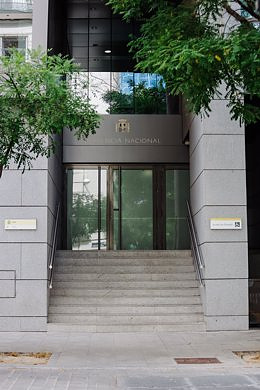The Prosecutor's Office interested in prosecuting the two companies and their top managers at the time Villarejo was hired in June 2022
MADRID, 17 Ene. (EUROPA PRESS) -
The Criminal Chamber of the National Court has requested the magistrate who is investigating the piece of the 'Tándem' case in which the work of the retired commissioner José Manuel Villarejo for Repsol and Caixa Bank was investigated to send him part of the requested documentation and that by mistake it did not arrive. The Prosecutor's Office awaits the resolution of the Chamber since the completion of the investigation was appealed in June 2022.
In an order dated January 12, and to which Europa Press has had access, the magistrates of the Third Section show that of the three CDs that they have been sent with documentation to resolve the Prosecutor's appeal, two of them are repeated --they house the same documents--.
"After reviewing the individuals designated by the Public Prosecutor, there are 3 CDS provided by Repsol SA: CD1 containing documents number 1 to 74, CD 2 containing documents number 75 to 161 and CD 3 containing documents number 75 to 161 (instead of contain documents no. 162 to 321)", they indicate.
Therefore, they require the Central Investigating Court number 6, headed by Manuel García-Castellón, that within the framework of that piece 21 of the 'Tándem' case, resubmit CD 3 but this time with the documents that go from 162 to 321.
It should be remembered that in its appeal, the Anti-Corruption Prosecutor requested that Repsol and Caixabank, the president of the first, Antonio Brufau, and the former president of the second, Isidro Fainé, be prosecuted. He justified his opposition to the order in which the magistrate exonerated the top managers and the companies by focusing on the "indications of the commission" of crimes by all of them and which, in his opinion, persist.
It was on June 2 when García-Castellón issued the order to pass to the abbreviated procedure, prosecuting the former heads of Security of both companies at the time of hiring: Rafael Araujo (Repsol) and Miguel Ángel Fernández Rancaño (CaixaBank). And he did it, he explained, for acts that can be described as active bribery.
In that order, the judge ordered the dismissal for both companies, for Brufau, Fainé and also for Repsol executives Luis Suárez de Lezo, Juan de Amunátegui and Joaquín Uris, and for the former general director of CaixaBank Media, Antonio Masanell.
All this within the framework of piece 21 of the 'Tándem' macro-cause, in which the magistrate investigated whether Repsol and CaixaBank had asked CENYT, the Villarejo business group, in 2011 to spy on the then president of Sacyr Luis Del Rivero and their environment to prevent the company and its Mexican ally Pemex from taking control of Repsol.
Regarding the oil company, the Public Ministry maintained in its letter that there are indications that the "controls required by the company's crime prevention plan were breached in the hiring" of Villarejo, seeking to "defend the social interest of the company against the syndication agreement reached by Sacyr".
But in addition, the Prosecutor's Office pointed out, "as has been verified indicatively in the present case, the award in favor of CENYT was approved by someone who, based on the amount, did not have the appropriate level to make it." "In addition, the award was made without the intervention of the purchasing unit and without the supplier being previously qualified. Likewise, all contracting was centralized in a single person, breaching the segregation of functions included in the prevention plans", explained.
As for CaixaBank, Anticorruption pointed out that "there is no record" that the "necessary proof of verification of the services provided by CENYT, as an essential prerequisite for the financial management area to authorize their payment" was complied with "adequately".
Along these lines, it also drew attention to an internal bank rule related to the budget management model --which is of "capital importance in the crime prevention model"-- and which would have been "blatantly violated in the process of verification and payment of the services contracted with CENYT".

 Exploring Cardano: Inner Workings and Advantages of this Cryptocurrency
Exploring Cardano: Inner Workings and Advantages of this Cryptocurrency Seville.- Economy.- Innova.- STSA inaugurates its new painting and sealing hangar in San Pablo, for 18 million
Seville.- Economy.- Innova.- STSA inaugurates its new painting and sealing hangar in San Pablo, for 18 million Innova.- More than 300 volunteers join the Andalucía Compromiso Digital network in one month to facilitate access to ICT
Innova.- More than 300 volunteers join the Andalucía Compromiso Digital network in one month to facilitate access to ICT Innova.-AMP.- Ayesa acquires 51% of Sadiel, which will create new technological engineering products and expand markets
Innova.-AMP.- Ayesa acquires 51% of Sadiel, which will create new technological engineering products and expand markets Abascal (Vox) criticizes that Sánchez is "victimizing" himself and calls for elections after his possible resignation
Abascal (Vox) criticizes that Sánchez is "victimizing" himself and calls for elections after his possible resignation Carlos Alcaraz reaches the round of 16 in Madrid without breaking a sweat
Carlos Alcaraz reaches the round of 16 in Madrid without breaking a sweat Some 5,000 people demonstrate in front of Congress for democracy, hours before Sánchez's decision
Some 5,000 people demonstrate in front of Congress for democracy, hours before Sánchez's decision STATEMENT: Intelligent systems used in the construction of the deepest underwater tunnel in China
STATEMENT: Intelligent systems used in the construction of the deepest underwater tunnel in China How Blockchain in being used to shape the future
How Blockchain in being used to shape the future Not just BTC and ETH: Here Are Some More Interesting Coins Worth Focusing on
Not just BTC and ETH: Here Are Some More Interesting Coins Worth Focusing on UPV students build a prototype of a wooden house to move to Equatorial Guinea
UPV students build a prototype of a wooden house to move to Equatorial Guinea The UA opens the call for the Impulso 2024 Awards for the best innovative business initiatives
The UA opens the call for the Impulso 2024 Awards for the best innovative business initiatives ALI, virtual assistant from Alicante, internationally recognized by the OECD
ALI, virtual assistant from Alicante, internationally recognized by the OECD Retrópolis brings the golden age of video games and computing to the UPV
Retrópolis brings the golden age of video games and computing to the UPV A million people demonstrate in France against Macron's pension reform
A million people demonstrate in France against Macron's pension reform Russia launches several missiles against "critical infrastructure" in the city of Zaporizhia
Russia launches several missiles against "critical infrastructure" in the city of Zaporizhia A "procession" remembers the dead of the Calabria shipwreck as bodies continue to wash up on the shore
A "procession" remembers the dead of the Calabria shipwreck as bodies continue to wash up on the shore Prison sentences handed down for three prominent Hong Kong pro-democracy activists
Prison sentences handed down for three prominent Hong Kong pro-democracy activists ETH continues to leave trading platforms, Ethereum balance on exchanges lowest in 3 years
ETH continues to leave trading platforms, Ethereum balance on exchanges lowest in 3 years Investors invest $450 million in Consensys, Ethereum incubator now valued at $7 billion
Investors invest $450 million in Consensys, Ethereum incubator now valued at $7 billion Alchemy Integrates Ethereum L2 Product Starknet to Enhance Web3 Scalability at a Price 100x Lower Than L1 Fees
Alchemy Integrates Ethereum L2 Product Starknet to Enhance Web3 Scalability at a Price 100x Lower Than L1 Fees Mining Report: Bitcoin's Electricity Consumption Declines by 25% in Q1 2022
Mining Report: Bitcoin's Electricity Consumption Declines by 25% in Q1 2022 Oil-to-Bitcoin Mining Firm Crusoe Energy Systems Raised $505 Million
Oil-to-Bitcoin Mining Firm Crusoe Energy Systems Raised $505 Million Microbt reveals the latest Bitcoin mining rigs -- Machines produce up to 126 TH/s with custom 5nm chip design
Microbt reveals the latest Bitcoin mining rigs -- Machines produce up to 126 TH/s with custom 5nm chip design Bitcoin's Mining Difficulty Hits a Lifetime High, With More Than 90% of BTC Supply Issued
Bitcoin's Mining Difficulty Hits a Lifetime High, With More Than 90% of BTC Supply Issued The Biggest Movers are Near, EOS, and RUNE during Friday's Selloff
The Biggest Movers are Near, EOS, and RUNE during Friday's Selloff Global Markets Spooked by a Hawkish Fed and Covid, Stocks and Crypto Gain After Musk Buys Twitter
Global Markets Spooked by a Hawkish Fed and Covid, Stocks and Crypto Gain After Musk Buys Twitter Bitso to offset carbon emissions from the Trading Platform's ERC20, ETH, and BTC Transactions
Bitso to offset carbon emissions from the Trading Platform's ERC20, ETH, and BTC Transactions Draftkings Announces 2022 College Hoops NFT Selection for March Madness
Draftkings Announces 2022 College Hoops NFT Selection for March Madness























